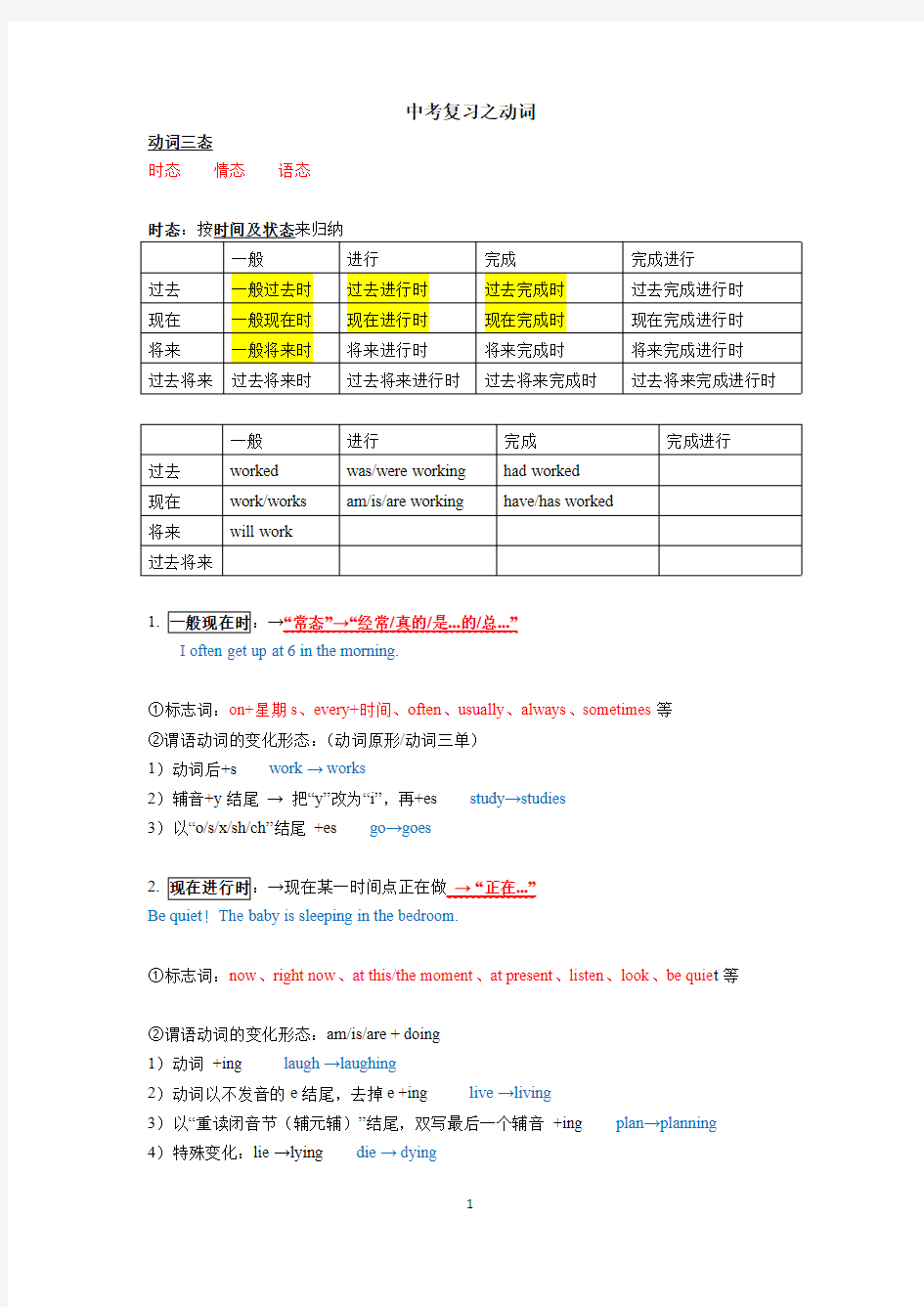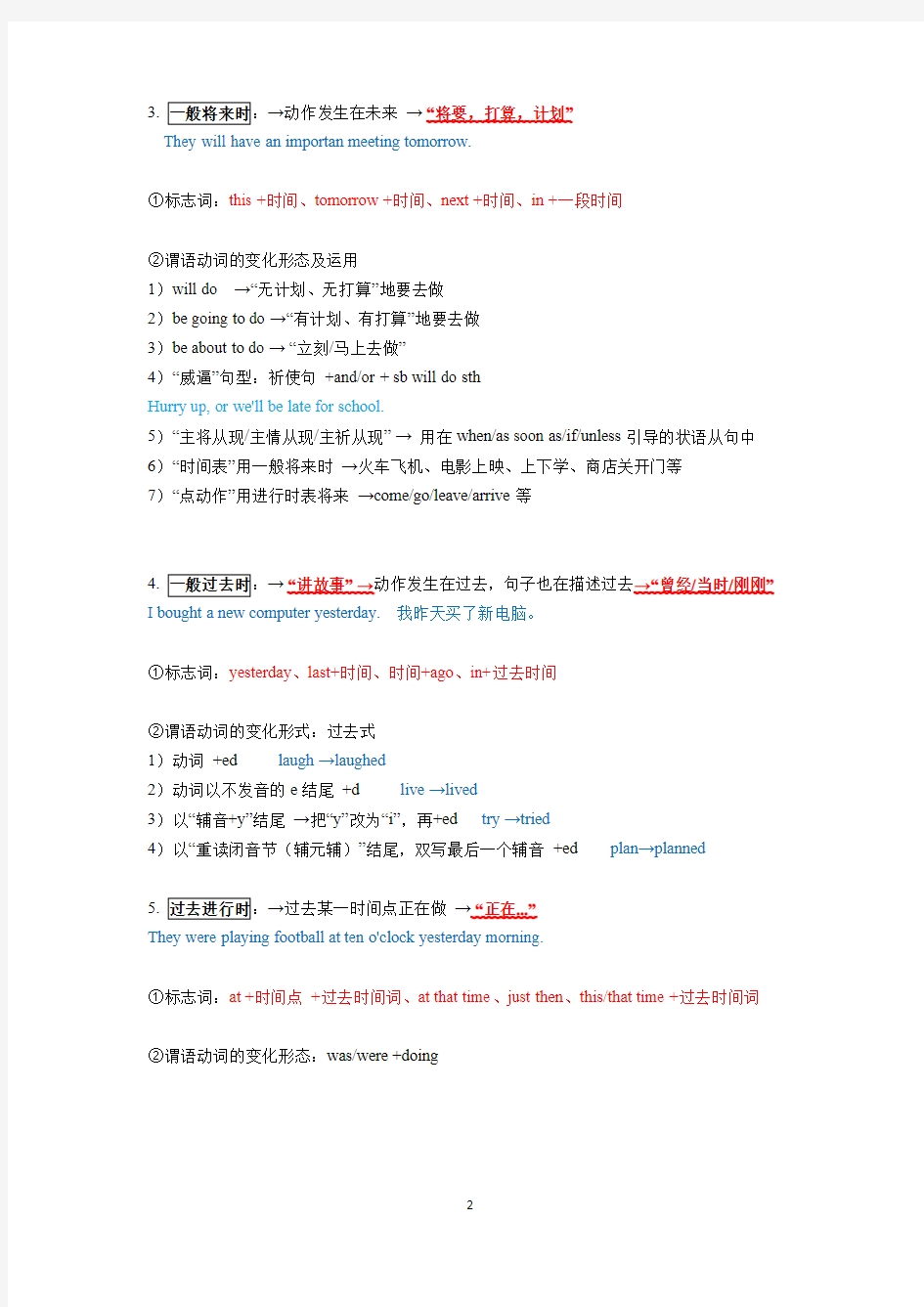中考英语复习之动词


中考复习之动词
动词三态
时态情态语态
一般进行完成完成进行过去worked was/were working had worked
现在work/works am/is/are working have/has worked
将来will work
过去将来
1.→“常态”→“经常/真的/是...的/总...”
I often get up at6in the morning.
①标志词:on+星期s、every+时间、often、usually、always、sometimes等
②谓语动词的变化形态:(动词原形/动词三单)
1)动词后+s work→works
2)辅音+y结尾→把“y”改为“i”,再+es study→studies
3)以“o/s/x/sh/ch”结尾+es go→goes
2.→现在某一时间点正在做→“正在...”
Be quiet!The baby is sleeping in the bedroom.
①标志词:now、right now、at this/the moment、at present、listen、look、be quie t等
②谓语动词的变化形态:am/is/are+doing
1)动词+ing laugh→laughing
2)动词以不发音的e结尾,去掉e+ing live→living
3)以“重读闭音节(辅元辅)”结尾,双写最后一个辅音+ing plan→planning 4)特殊变化:lie→lying die→dying
3.→动作发生在未来→“将要,打算,计划”
They will have an importan meeting tomorrow.
①标志词:this+时间、tomorrow+时间、next+时间、in+一段时间
②谓语动词的变化形态及运用
1)will do→“无计划、无打算”地要去做
2)be going to do→“有计划、有打算”地要去做
3)be about to do→“立刻/马上去做”
4)“威逼”句型:祈使句+and/or+sb will do sth
Hurry up,or we'll be late for school.
5)“主将从现/主情从现/主祈从现”→用在when/as soon as/if/unless引导的状语从句中6)“时间表”用一般将来时→火车飞机、电影上映、上下学、商店关开门等
7)“点动作”用进行时表将来→come/go/leave/arrive等
4.→“讲故事”→动作发生在过去,句子也在描述过去→“曾经/当时/刚刚”
I bought a new computer yesterday.我昨天买了新电脑。
①标志词:yesterday、last+时间、时间+ago、in+过去时间
②谓语动词的变化形式:过去式
1)动词+ed laugh→laughed
2)动词以不发音的e结尾+d live→lived
3)以“辅音+y”结尾→把“y”改为“i”,再+ed try→tried
4)以“重读闭音节(辅元辅)”结尾,双写最后一个辅音+ed plan→planned
5.→过去某一时间点正在做→“正在...”
They were playing football at ten o'clock yesterday morning.
①标志词:at+时间点+过去时间词、at that time、just then、this/that time+过去时间词
②谓语动词的变化形态:was/were+doing
6.→动作发生在过去,句子却在描述现在→“已经”
We have just cleaned the classroom.
①标志词:already(肯定句)、just、yet(疑问/否定句)、ever、never、before、ever since、since then、since+过去时间点/一般过去时的从句、for+时间段
I have studied English for six years.
→I have studied English since I was six years old.
②谓语动词的变化形态:has/have+done
③has/have been to+sp去过某地(人已回)
has/have gone to+sp去了某地(人未回)
④短暂性动词→延续性动词(表状态)
buy/get→have borrow→keep die→be dead
begin/start→be on leave→be away finish→be over
open→be open close→be closed marry→be married become→be catch→have
能够/可能/意愿/命令的情感状态
1.表示“能够”的情态动词有:can,could译为“能够”,“可以”
Students can easily skip half their homework.
2.表示“可能”的情态动词有:may,might,can,could译为“可能”,“也许”
We might then begin to solve our immigration challenges.
3.表示“意愿”“打算”的情态动词有:will,would,be going to译为“希望”,“愿意”
①表示推测,可表示对现在或将来的推测(高中部分)
That will be Judy.I can hear her at the door.
②表示愿望
I’ll do anything that I can.
4.表示“应该”的情态动词有:shall,should,must,need译为“必须”,“应该”You must obey the traffic rules.
1.can’t表能力,译为“不会,不能”
He can't finish his homework without teacher's help.
表推测,译为“不可能”
Tom can't be here because he went out just now.
2.mustn’t表示明令禁止,译为“不可以”,“禁止”
We mustn't leave the gate open.你一定不要让大门敞开着。
You mustn't drive after drinking.
1.----Must.....?
----No,...needn't.或don't have to.
2.----May...?(表请求)
----Yes,...can.
----No,...can't.或...mustn't(表禁止)
→主语和谓语动词间存在被动关系→“被/受...”
结构:原宾语+be动词相应的时态+动词过去分词+by+原主语Students clean the classroom.
→The classroom is cleaned by students.
1.被动语态的构成:be+done
2.各个时态的被动:
①一般现在时的被动:am/is/are done
②一般过去时的被动:was/were done
③一般将来时的被动:will be done
④现在完成时的被动:has/have been done
3.情态动词的被动:can/may/should/may be done
The bridge will be completed in two years.
1.be动词
2.表示主语保持某种状态或态度的动词:keep,remain,stay等
The gift remains intact.
3.表示“看起来,似乎”这一概念:look,seem,appear等
He seems very sad.
4.表示主语的感觉动词,也是感观系动词:feel,smell,sound,taste The Chinese food taste delicious.
5.表示主语变化的动词:become,grow,turn,get等
The leaves turns yellow.
非谓语三大形式:①不定式to do:表目的,计划
②现在分词doing:表主动,进行
③过去分词done:表被动,完成
1)动词+to do
want=would like to do sth想要做某事
agree to do sth同意做某事
refuse to do sth拒绝做某事
decide to do sth决定做某事
plan to do sth计划做某事
expect to do sth期盼做某事
hope to do sth希望做某事
like/love to do sth喜欢做某事
try to do sth努力做某事
2)动词+sb+不定式to do
这类动词有:allow sb to do sth允许某人做某事
ask sb to do sth要求某人做某事
teach sb to do sth教某人做某事
wish sb to do sth希望某人做某事
want sb to do sth想要某人做某事
advise sb to do sth建议某人做某事
tell sb to do sth告诉某人做某事encourage sb to do sth鼓励某人做某事
invite sb to do sth邀请某人做某事warn sb(not)to do sth警告某人(不)做某事
3)动词+doing
这类动词有:enjoy doing sth喜欢做某事
finish doing sth结束做某事
practise doing sth练习做某事
mind doing sth介意做某事
be busy doing sth忙于做某事
look forward to doing sth期盼做某事
have trouble/difficulty(in)doing sth做某事有困难
4)动词+动词原形do
口诀:“为什么不最好一听二看三让半帮助”why not do sth为什么不做某事
had better do sth最好做某事
hear sb do sth听到某人做某事
see/watch sb do sth听到某人做某事make/let/have sb do sth让某人做某事help sb(to)do sth帮助某人做某事
